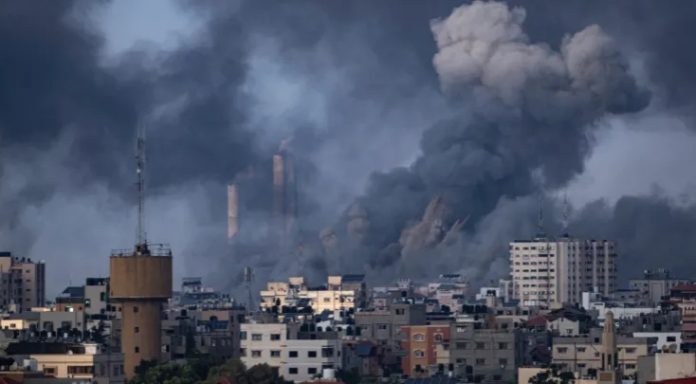WHO demands the provision of fuel to Gaza for medical facilities and “safe, sustainable and uninterrupted access to Gaza” to tackle the worsening humanitarian crisis there.
Tarik Jasarevic, WHO spokesman, said that after 19 days of constant Israeli airstrikes and shelling and a near-total land, sea and air blockade of the Palestinian territory, one of the only ways to compensate for the catastrophic health situation in Gaza was to bring fuel to the region. Jasarevic told CGTN Europe via videocall from Cairo:
There is a big need for fuel right now in Gaza, not only to run generators that provide electricity to hospitals, but also for desalination plants so there could be clean water for the population, but also for the health facilities. Simply, you cannot run hospitals without electricity. You cannot not have lights in your hospital. There are surgical theaters, there are incubators, there are dialysis machines, there are other machines that simply need electricity. So this is why when we say fuel is equally important as medical supplies.
He added that it was virtually impossible to provide life-saving medical care to tens of thousands of people in need, such as pregnant women, newborns, patients with chronic diseases and people being treated for cancer, when health facilities in Gaza were overcrowded and fuel supplies were rapidly running out. WHO spokesman noted:
There is a really big number of people from mostly vulnerable groups in the population who need hospitals and health centers to keep running. However, right now there are 1,235 hospitals that are out of service and others are really rationing with little fuel that they have.
Israel still holds Hamas responsible for the humanitarian crisis in Gaza, despite the fact that Israel has closed its borders with Gaza and effectively stopped traffic through the Egyptian Rafah crossing. Israeli authorities say they are now allowing medicine, food and water into the enclave. However, Jasarevic says humanitarian access to the Strip remains extremely limited. He added:
What we know from the WHO side is that we were only able to bring four trucks of medical supplies on Saturday, and since then we were not able to bring more. That’s nowhere near enough of what is needed right now. And again, besides medical supplies, we need fuel because we need hospitals to be running, otherwise the lives of patients will be in danger.
According to Jasarevic, another major problem for humanitarian organisations in Gaza is the lack of security guarantees for those delivering supplies, especially in northern Gaza. Earlier, Israel issued a general order to evacuate the entire population of the area, including medical facilities. According to Israeli authorities, anyone left in northern Gaza will be considered Hamas supporters. Jasarevic said:
There are hospitals in the north of Gaza that are hosting more than 2,000 patients right now, and they are also running out of medical supplies and fuel. So with all these people – again, we are talking about babies, people who have renal problems, who need dialysis, people on ventilators, the 50,000 pregnant women in Gaza… there is a really big, big portion of the population that depends on healthcare, and healthcare requires things like fuel, clean water and medical supplies.
According to Jasarevic, the most important thing now is to ensure safe, sustainable and uninterrupted access to Gaza.
We need to be sure that we can bring as much material as we need, and right now on the Egyptian side of the border, we have relief trucks waiting. We also need to make sure that the trucks, the medical workers who are bringing those supplies to hospitals, who are receiving them, will not be a target. Eventually, what is really needed is the end of hostilities. Even if we bring in medical material, medicines, even fuel, if the fighting continues, the bombardment continues, there will be more casualties, there will be more wounded people, there will be more deaths.
As for the impact of a possible Israeli ground invasion on humanitarian relief efforts in Gaza, Jasarevic said the need for immediate delivery of medical aid and supplies to the Strip would be even more urgent than it is now. He added:
Healthcare workers in Gaza are doing an amazing job. At the same time, they fear for their lives, they have to take care of the safety of their family. And at the same time, they are really doing their best to treat people. So what we can do is try to help them so they can do their job.
On October 7, Hamas announced the launch of Operation Al-Aqsa Flood against Israel. The group’s militants then infiltrated into Israel and began firing rockets from the Gaza Strip.
In response, the Israel Defense Forces launched Operation Iron Sword against Hamas. Within a few days, the Israeli army took control of all settlements near the border with the Gaza Strip and began launching airstrikes against targets, including civilians in the Strip. The Israeli authorities also announced a complete siege of the Gaza Strip: water, food, electricity, medicine and fuel supplies were cut off.
